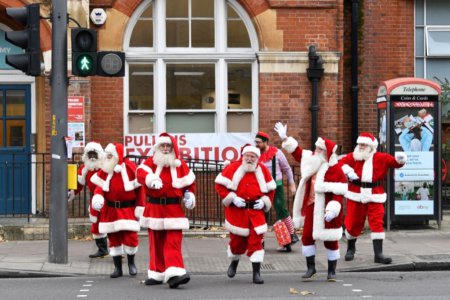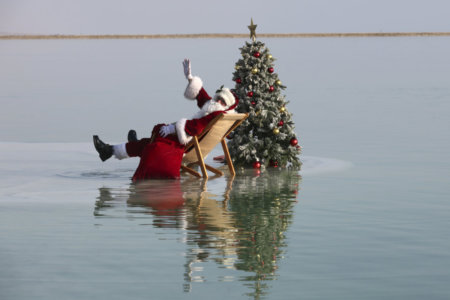
Christmas beats in the lively pulse of December, right when Mariah Carey starts defrosting on the speakers. Amid it all, you might be trying to find countries that don’t celebrate Christmas because you’ve had enough of it.
In 2021, a survey found that 55% of Americans experienced loneliness through the holiday season. That’s because, for many people, Christmas is a staunch reminder of what’s been lost.
I hate Christmas! I really do. I hate people saying to me “how can u hate Xmas? It’s wonderful.”
No, it isn’t
Too commercial. We all run around like mad buying stuff we don’t need buying for people we don’t like with money we don’t have. It’s sheer madness!— wendyemily (@wendyemily2) December 1, 2020
It’s a pain that comes with growing up; the older you get, the more baggage you have, and the more the magic of Christmas wears off — whether it is because they’re dealing with the loss of their loved ones, the struggles with high inflation, or having to deal with the rude customers of the season.
For many, hardship is the prime reason to bask in the comfort of Christmas and family.
For the unlucky ones, they have no one to turn to but the blares of “All I Want for Christmas is You” in every store. Finding a remedy to the holiday blues isn’t that simple, and it feels almost mocking to witness the commercial haze of Christmas.
That raises the question: when did the holidays become so complicated?

The religious reasoning behind Christmas has lost its weight over time, but many countries still retain the practice. Source: AFP
The meaning of Christmas
In the Democratic Republic of Congo, Christmas is a quiet affair.
On Christmas Eve, families retreat after their meals to the churches for a lineup of choirs and a classic Nativity play. It’s drummed up to the dramatics; a celebration of life in the name of Jesus Christ. The next day, service kicks off at nine in the morning.
Over 50% of Congolese people are Christian, so it’s a religious festivity before it is a cultural tradition. The decorations aren’t extravagant, and gift-giving happens little to none. It’s about family, hope, kindness, and sharing first before it’s about materialism.
That isn’t always the case, however.
The religious sentiment behind Christmas has faded so much over time that people start to think of gifts to arrange underneath a fir tree before they even glimpse at church — but it’s not something that all people are opposed to.
“This is the first Christmas since time immemorial that most people in this country are not Christians,” Polly Toynbee, Guardian columnist, wrote in 2022 about England and Wales. “I celebrate any decline in superstition, any rise in those who look life and death in the eye with no expectation of anything beyond this earth.”
That year, the Christian population in England and Wales had declined from 59% to 46%. That’s less than half the population, which makes Christianity a minority population in the UK. About 8 million folks identify with “no religion” altogether.
Despite that, most people in those countries are still on jolly terms with the holiday itself. Even Toynbee, with her firm standing against Christianity, revels in a carol and a rerun of “It’s a Wonderful Life” every once in a moon.
But that doesn’t mean there aren’t people vehemently against the shift.
“Is it necessary for people who don’t believe in the gospel to partake?” Journalist and author Lauren Windle writes on Woman Alive. “For us, Easter is a bigger deal than Christmas, and we’ve allowed the enthusiasm and traditions of the world to sweep us away with festive fever.”
In certain countries, Christmas is a cultural tradition before it is a religious festivity.
Did my yearly reservation of the KFC Christmas set which me and the wife will pick up next to our hotel in Yokosuka when we’re there on Christmas.
I’ll be taking her to a fancier dinner on Christmas Eve, but Christmas Day is fried chicken day in the Japanese tradition December 1, 2020
It began with Japan’s first KFC manager over 40 years ago. Takeshi Okawara heard a couple of foreigners express longing for their home meals and promptly created a Christmas party bucket — one that about 3.6 million people still celebrate today.
You can’t take “Christ” out of Christmas, just like you can’t pluck the sun out of the sky. But it’s no secret that Christmas is now a prism for many meanings, and it’s impossible for the entire world to place weight on one face of the argument or the other.
That would be going against the very spirit of togetherness itself.
“The true danger lies in misinterpreting the holiday as one or the other: religion or commercialisation,” The Reflector writes. “Christmas has long distanced itself from its initial religious origins, and must separate itself from its heightened commercialisation to get to something so simple: Christmas is a time expressly to celebrate and appreciate love.”

If this is the face you’ll be sporting for Christmas, maybe opt for a trip to these countries that don’t celebrate Christmas. Source: AFP
Seven countries that don’t celebrate Christmas
Bhutan
The Kingdom of Bhutan is a landlocked country in South Asia perched on the Eastern Himalayas. It’s predominantly Buddhist, with roots dating back to 747 A.D. They’re one of the countries that don’t celebrate Christmas, as only 1% of the 793,000+ population is Christian.
Instead, in December, villagers don traditional Gho and Kira garments to celebrate festivals like the Nalakhar Tshechu, and the Druk Wangyel Tshechu — two out of 21 local festivals in the month. The weather’s a good, moderate kind of cold, between 1°C to 10°C, which makes it a better time to catch the Himalayan views.
Morocco
Located in the Northwest of Africa, Morocco is over 300,000 years rich with Berber, Arab, African, and European heritage.
Since it’s a Muslim country, December 25 is as arbitrary a day as ever. Children go to school, and people go to work. The larger cities practice certain festivities, but for the most part, it’s clear of the glitzy glamour of Christmas.
If you’re the #1 hater of snow, you can quite literally plop yourself in the Sahara Desert. The last recorded snowfall was in January 2022, but the chillier winds of December make a more pleasant ride on a camel’s back.
If the desert isn’t your thing, Morocco’s best known for its imperial cities: Rabat, Marrakesh, Meknez, and Fez. The maze of medinas throughout each city is a destination for local markets, mosques, and artisan shopping — and it’s a window to the past.

Most Christians in Kazakhstan belong to the Orthodox Church, so Christmas isn’t in December. Source: AFP
Kazakhstan
Kazakhstan isn’t technically one of those countries that don’t celebrate Christmas. But here’s the cheat card: Christmas is often celebrated on January 7 instead of December 25.
The 72% Muslim population means that most families don’t celebrate Christmas, and it isn’t a public holiday on December 25 either. Most Christians in the country are Orthodox, meaning Christmas falls on January 7, according to the calendar.
It does mean that you can escape the typical festive window, but fair warning: the Kazakhs take their New Year’s celebrations very seriously. Evergreen trees are adorned with lights and ornaments, and the temperatures dip below -10°C in December.
Tunisia
Just like Kazakhstan, Tunisia is more likely to ring in the new year with a festive spirit than Christmas. Its Sunni Islam population leads the majority by 98.2%, so you’re hardly going to find people blasting a Christmas jingle on the stereo.
The Republic of Tunisia sits on the northernmost point of Africa, between Algeria and Libya — two other countries that don’t celebrate Christmas. The weather’s cooler in Tunisian terms, but it’s much warmer than most Western countries at a daily maximum of 17°C. You can cruise the medinas, find the ancient ruins, or run to the Hammamet Beach.

Laos, Bhutan, and Mongolia mainly practice Buddhism, so that’s where their celebrations stem from, and why they’re on this list of countries that don’t celebrate Christmas. Source: AFP
Laos
Laos is the only landlocked country in Southeast Asia, separated from Thailand by the Mekong River. Its neighbour lauds over Christmas much more than it does, but that’s also because most people in Laos practice Theravada Buddhism. Less than 2% of Christians reside in the country of approximately 7.7 million people.
It’s really only in the capital city of Vientiane where you’re going to find expatriates clinking Christmas beers in ugly sweaters. It’s a good place to go if you want to keep the holidays lowkey, but if you’re looking to escape it altogether — you can do that too.
Instead, try plunging into their natural landscapes. The Si Phan Don is an archipelago of uninhabited islands on the Mekong River and a great place to get off the grid. Buddhist festivals spring up this year too, specifically the ritual of the “That Ing Hang Festival.”
Mongolia
Mongolia’s Buddhist origins date way back to the third century BC during the reign of the Indian Emperor Ashoka. With such deep-cut roots in the religion, Buddhist festivals are abundant. They’re one of the countries that don’t celebrate Christmas, since only 2.2% of the population is actually Christian.
Instead, August is the hallmark of festivity in Mongolia.
The Danshig Naadam takes place on the first weekend of August to celebrate the first Buddhist leader, the Holy Zanabazar. It’s held on a large plain west of Ulaanbaatar, where the ritual of the “Tsam” — a masked dance — is performed. There’ll also be cultural activities like horse racing, wrestling, and more.

Uzbekistan is an underrated tourist destination and one of the countries that don’t celebrate Christmas. Source: AFP
Uzbekistan
Christmas isn’t celebrated in Uzbekistan, a landlocked country in Central Asia populated by Muslims. It’s one of the most underrated countries for tourist destinations, and there’s nothing like it.
The city of Samarkand is a grandiose heritage site filled with medieval Islamic architecture accented by blue-printed mosques.
The New Year is one of the most celebrated holidays on the Uzek calendar, and the festivities arise throughout December. However, for over a decade, it was a point of contention between different parties in Uzbekistan.
On one side of the coin, conservative Muslims deemed the New Year’s “unacceptably secular.” Anvar Zakirov – the head of the Tashkent city hall department of public education — had tried to ban year-end parties in 2004 in favour of the Nowruz holiday, an Uzbek hallmark.










